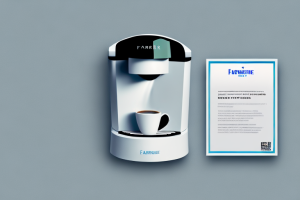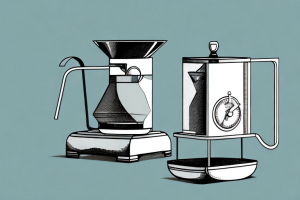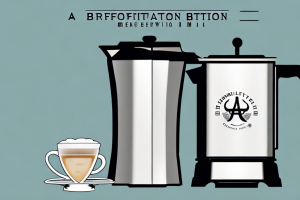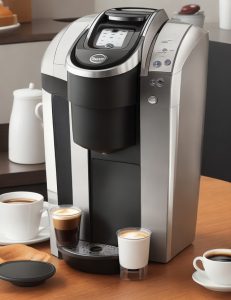Eco-friendly Coffee Maker

An eco-friendly coffee maker with its components and features
Coffee makers can be found in most kitchens around the world. However, their convenience often comes at a cost to the environment. Traditional coffee makers consume a considerable amount of energy, produce waste, and are often made from materials that are harmful to the environment.
The Environmental Impact of Traditional Coffee Makers
Traditional coffee makers can have a significant negative impact on the environment. Most coffee makers use electricity and water, two resources that are precious and limited. The manufacturing process of coffee makers, often includes the use of non-renewable resources and materials that can be harmful if not disposed of properly.
Additionally, used coffee grounds and filters contribute to landfills and their decomposition in landfills releases methane, a potent greenhouse gas.
Furthermore, the production and transportation of coffee beans also have a significant environmental impact. The use of pesticides and fertilizers in coffee farming can lead to soil degradation and water pollution. The transportation of coffee beans from farms to processing plants and then to stores also contributes to carbon emissions and air pollution.
However, there are eco-friendly alternatives to traditional coffee makers, such as French presses and pour-over coffee makers, which require no electricity and produce less waste. Additionally, using reusable coffee filters and composting used coffee grounds can significantly reduce the environmental impact of coffee consumption.
How to Make Your Morning Coffee More Sustainable
An eco-friendly coffee maker is an ideal solution for people who want to enjoy their morning coffee while reducing their environmental footprint. Here are a few tips to make your morning cup of Joe more sustainable:
1. Use a reusable coffee filter or compostable filters instead of disposable ones.
2. Use a manual coffee maker, such as a French press, that doesn’t use an electric power source.
3. Choose organic, fair trade coffee beans to ensure that farmers receive a fair wage and that the beans are grown without harmful pesticides and herbicides.
4. Purchase a coffee maker made from sustainable materials, such as bamboo, recycled plastic, or stainless steel.
5. Consider using a milk frother made from sustainable materials, such as glass or stainless steel, instead of disposable, single-use frothers.
6. If you prefer flavored coffee, try adding natural flavorings like cinnamon or vanilla instead of using artificial syrups that come in plastic bottles.
By following these simple tips, you can enjoy your morning coffee guilt-free, knowing that you are doing your part to reduce your environmental impact. Not only will you be helping the planet, but you’ll also be supporting sustainable businesses and farmers who are committed to ethical and eco-friendly practices. So, go ahead and savor that delicious cup of coffee, knowing that you’re making a positive difference in the world.
Choosing the Right Materials for an Eco-Friendly Coffee Maker
Picking the right material for your sustainable coffee maker is essential in reducing its impact on the environment. When choosing the right material for your coffee maker, look for one made from eco-friendly materials, such as bamboo, stainless steel, or recycled plastic.
These materials are durable, safe for the environment, and can be recycled or decomposed safely. Additionally, these materials don’t release any harmful chemicals or toxins during their life cycle, making them sustainable alternatives to traditional coffee makers.
Another important factor to consider when choosing materials for your eco-friendly coffee maker is the energy efficiency of the product. Look for coffee makers that are designed to use less energy, such as those with automatic shut-off features or those that use a thermal carafe instead of a hot plate to keep the coffee warm.
By choosing an energy-efficient coffee maker, you can reduce your carbon footprint and save money on your energy bills in the long run. It’s important to remember that every small step towards sustainability counts, and choosing the right materials and features for your coffee maker is a great place to start.
Top Brands and Models of Eco-Friendly Coffee Makers
Some of the top eco-friendly coffee makers available in the market include the Aeropress, Chemex, French Press, and Moka Pot. These coffee makers are designed to be sustainable and are made from eco-friendly materials such as glass, bamboo, stainless steel, or recycled plastic.
Some of the benefits of these coffee makers are that they are durable, easy to clean, and use minimal energy to brew your coffee. When shopping for an eco-friendly coffee maker, consider your personal preferences and choose a brand that aligns with your values and needs.
In addition to being eco-friendly, some of these coffee makers also offer unique brewing methods that can enhance the flavor of your coffee. For example, the Chemex uses a pour-over method that allows for a slower extraction process, resulting in a smoother and less bitter cup of coffee. The Aeropress uses a combination of immersion and pressure to create a rich and flavorful cup of coffee in just a few minutes.
The Benefits of Owning an Eco-Friendly Coffee Maker
Owning an eco-friendly coffee maker has several benefits, including reducing your environmental footprint, saving you money in the long term, and providing a better coffee experience.
Eco-friendly coffee makers consume less energy and water, which saves you money on your power and water bills. Additionally, they are made from sustainable materials, reducing the need to purchase a new coffee maker in the future.
Eco-friendly coffee makers also provide an excellent coffee experience, as they allow you to control the temperature and brewing process, resulting in a better cup of coffee.
Another benefit of owning an eco-friendly coffee maker is that it promotes ethical and sustainable coffee production. Many eco-friendly coffee makers are designed to work with fair trade and organic coffee beans, which are grown without harmful chemicals and support small-scale farmers. By choosing an eco-friendly coffee maker, you are contributing to a more sustainable and ethical coffee industry.
How to Clean and Maintain Your Eco-Friendly Coffee Maker
Proper maintenance and cleaning of your eco-friendly coffee maker are essential in prolonging its lifespan and ensuring that it operates efficiently. Here are some tips for cleaning and maintaining your sustainable coffee maker:
1. Clean your coffee maker after every use using warm water and soap, ensuring that you remove all coffee residue.
2. Rinse the coffee maker using cold water to remove any soap residue, ensuring that you dry it using a clean towel.
3. Regularly descale your coffee maker using vinegar or descaling solution, depending on the manufacturer’s instructions.
4. Regularly replace the filters, ensuring that you use compostable or reusable filters.
5. To ensure that your coffee maker is operating at its best, it is important to use high-quality coffee beans. Low-quality beans can leave behind more residue, which can clog your coffee maker and affect its performance.
6. If you notice any issues with your coffee maker, such as slow brewing or strange noises, it may be time to deep clean your machine. This involves disassembling the coffee maker and cleaning each part thoroughly. Refer to your manufacturer’s instructions for guidance on how to do this properly.
Reducing Waste: Tips for Using an Eco-Friendly Coffee Maker
Using an eco-friendly coffee maker is an excellent way to reduce your waste production, but there are additional measures you can take to reduce waste further. Here are some tips for reducing waste:
1. Use a reusable cup or mug instead of disposable cups when drinking your coffee.
2. Use a refillable coffee bean container, instead of buying single-use coffee pods or packages.
3. Compost your used coffee grounds and filters instead of disposing of them in the trash.
4. Consider purchasing a coffee maker with a built-in water filter, to reduce the need for bottled water.
5. Buy coffee beans in bulk to reduce packaging waste, and bring your own reusable bags or containers to the store.
The Future of Sustainable Coffee Making Technology
The coffee industry is continually evolving, with numerous companies investing in sustainable coffee-making technology. Future sustainable coffee makers may include features such as self-cleaning mechanisms, the ability to brew a variety of coffee types, and increased energy efficiency.
Additionally, coffee-making technology may incorporate smart systems, allowing you to control the coffee-making process, ensuring that it aligns with your personal values and preferences.
Another exciting development in sustainable coffee-making technology is the use of biodegradable coffee pods. Traditional coffee pods are made of plastic and contribute to the growing problem of plastic waste. However, companies are now producing coffee pods made from biodegradable materials such as paper and cornstarch. These pods break down naturally, reducing their impact on the environment.
Comparing the Cost of Traditional vs. Eco-Friendly Coffee Makers
When shopping for a coffee maker, cost is a significant factor to consider. Traditional coffee makers can be purchased for as little as $10, while eco-friendly coffee makers can cost upwards of $100.
However, it’s essential to consider the long-term costs of owning a coffee maker. Eco-friendly coffee makers consume less energy and water, saving you money in the long term. Additionally, they are made from sustainable materials, reducing the need to purchase a new coffee maker in the future.
Another factor to consider when comparing traditional and eco-friendly coffee makers is the impact on the environment. Traditional coffee makers often use disposable paper filters, which contribute to waste in landfills. Eco-friendly coffee makers, on the other hand, use reusable filters or pods, reducing the amount of waste produced. By choosing an eco-friendly coffee maker, you can reduce your carbon footprint and contribute to a more sustainable future.
Making a Positive Impact with Your Daily Cup of Coffee
Your daily cup of coffee can have a more significant impact than you may think. Choosing an eco-friendly coffee maker is an excellent way to reduce your environmental footprint and make a positive impact on the planet. Additionally, choosing fair trade, organic coffee beans, and reducing waste are additional ways you can make a positive impact with your daily coffee routine.
Another way to make a positive impact with your daily cup of coffee is to support local coffee shops. By choosing to buy your coffee from a local shop, you are supporting small businesses and the local economy. Local coffee shops often source their coffee beans from small, independent farmers, which helps to support sustainable agriculture and fair trade practices.
Furthermore, you can also consider using reusable coffee cups instead of disposable ones. Disposable coffee cups are a significant source of waste, and they are not recyclable due to the plastic lining inside. By using a reusable coffee cup, you can significantly reduce the amount of waste you produce and make a positive impact on the environment.
The Role of Consumer Choices in Promoting Sustainability in the Coffee Industry
The coffee industry is becoming more aware of the impact it has on the environment. However, it’s essential to note that consumers play a significant role in promoting sustainability in the coffee industry. As consumers, we can make a positive impact by supporting sustainable coffee makers, choosing organic and fair trade coffee beans, and reducing waste.
In conclusion, an eco-friendly coffee maker is an ideal solution for people who want to enjoy their morning coffee while reducing their environmental footprint. Sustainable coffee makers are made from eco-friendly materials, consume less energy and water, and reduce waste production. Additional measures, such as choosing organic and fair trade coffee beans and reducing waste, are additional ways consumers can make a positive impact on the coffee industry.
Another way consumers can promote sustainability in the coffee industry is by being mindful of the packaging used for coffee products. Many coffee brands use excessive packaging, such as plastic bags and single-use pods, which contribute to waste and pollution. By choosing coffee brands that use sustainable packaging, such as biodegradable bags or reusable containers, consumers can reduce their environmental impact.
Furthermore, consumers can also support coffee shops and cafes that prioritize sustainability. These establishments may use eco-friendly materials for their cups and utensils, offer discounts for customers who bring their reusable cups, or source their coffee beans from sustainable and ethical sources. By choosing to support these businesses, consumers can encourage more coffee shops to adopt sustainable practices and promote sustainability in the industry as a whole.



